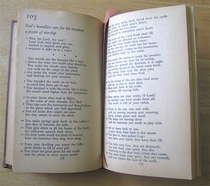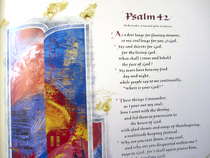 PHOTO: Mary van Balen from Volume 4 Saint John’s Bible: Psalms (Originally published in the Catholic Times, May 13, 2012 © 2012 Mary van Balen)
PHOTO: Mary van Balen from Volume 4 Saint John’s Bible: Psalms (Originally published in the Catholic Times, May 13, 2012 © 2012 Mary van Balen)
How do you manage Liturgy of the Hours? I asked a friend who is an oblate of a Benedictine abbey.
I dont get to it everyday. I do it when I can. Often, I just read through the Psalter.
That conversation came to mind when I was discouraged by my inability to fit more of the Hours into my daily life. So, I pulled a Psalter from shelves in my study. A gift from a Trappist friend, the old book had been rebound in the monastery with a plain burnt sienna fabric and blue end papers. Father Maurices name is written across the top with pencil in his beautiful calligraphic scrip along with a small cross and the year: 1965.
The Grail translation, new at the time, like the translation of psalms found in the Jerusalem Bible, is made from the Hebrew. As I held the book and read from the yellowed pages, I imagined Fr. Maurice sitting in the chapel at the Abbey of Gethsemane in Kentucky, chanting these ancient hymns day after day, year after year. I thought, too of my friends at Saint Johns Abbey in Collegeville, and the time I spent with them praying the psalms throughout the day.
Sometimes, reading the more violent ones, I have wondered why they remain in liturgical collections. I have heard others voice that concern and remember a story shared by a monk at St. Johns. At one time, they were considering the collection of psalms used in their prayer. Someone suggested removing the more violent ones. Why pray war songs, songs that include dashing children against the rocks or slaughtering ones enemies?
A monk of great stature in the community objected. Violence is part of Old Testament history. Indeed they are part of our history. Remove those, he said, and the Psalter just collapses.
Our world today is not so different from the ancient Hebrew one. Using drones to kill our enemies makes their deaths and those civilians who lose their lives, euphemistically called collateral damage, invisible but no less gruesome.We may desire revenge or exact punishment from those who wrong us. Sometimes the violence visited upon the poor and marginal peoples in our world results as much from inaction as from what we do. We are no strangers to violence. Perhaps that is why praying such psalms makes us uncomfortable. Such darkness makes us avert our eyes.
 As I prayed the Psalter I thought of St. Athanasius (2295-373CE) whose feast was May 2. He is known for his fight against the heresy of Arianism that claimed Jesus was in no way equal to God the Father, having been created, but what I most remember about Athanasius is his wonderful letter to Marcellinus that spoke eloquently of the interpretation of the Psalms. While other books of the Bible are filled with words that inspire or instruct, yet remain the words of the author, words of the psalms are like one’s own words that one read; and anyone who hears them is moved at heart, as though they voiced for him his deepest thoughts.
As I prayed the Psalter I thought of St. Athanasius (2295-373CE) whose feast was May 2. He is known for his fight against the heresy of Arianism that claimed Jesus was in no way equal to God the Father, having been created, but what I most remember about Athanasius is his wonderful letter to Marcellinus that spoke eloquently of the interpretation of the Psalms. While other books of the Bible are filled with words that inspire or instruct, yet remain the words of the author, words of the psalms are like one’s own words that one read; and anyone who hears them is moved at heart, as though they voiced for him his deepest thoughts.
Athanasius goes on to illustrate which psalms reflect which human situation or emotion: repentance, Psalm 51; bearing ones afflictions, Psalm 3. The list goes on. Just as in a mirror, he writes, the movements of our own souls are reflected in them and the words are indeed our very own, given us to serve both as a reminder of our changes of condition and as a pattern and model for the amendment of our lives.
That is why the psalms have survived as part of our prayer for millennia. That is why monks and the rest of us gather to chant or sing or read them every day. They remind us of who we are and of who God is. They reflect the light in our hearts as well as the darkness. The history of the psalms is our history and it is our present. The involvement of God in the lives of the Hebrews remind us that the Holy One remains involved in our lives.
 When I hold the old Psalter in my hands and pray the words printed there, I am connected not only with my monk friends, but also with my ancestors. I am in touch with my heart, and my journey and the God who embraces us all.
When I hold the old Psalter in my hands and pray the words printed there, I am connected not only with my monk friends, but also with my ancestors. I am in touch with my heart, and my journey and the God who embraces us all.
Click on this link if you would like to read Athanasius’ letter to Marcellinus.

Speak Your Mind